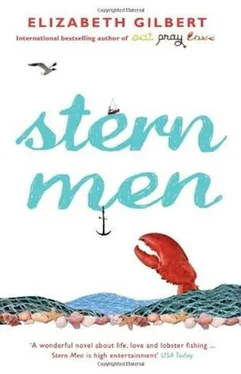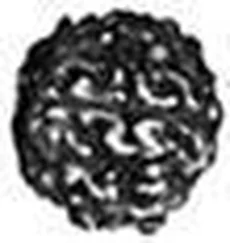But Lanford Ellis had no more to say, and the big nurse stepped in once more.
Naturally, Ruth Thomas never knew the details of the argument her parents had following Mr. Ellis’s offer. But she did know that a few points were made immediately clear, right there in the hospital room. There was no way on earth that Mary Smith-Ellis Thomas, child of an orphan, was going to put her son, no matter how disabled, into an institution. And there was no way on earth that Stan Thomas, tenth-generation islander, was going to move to Concord, New Hampshire. Nor would he allow his daughter to move there, where she might be turned into a slave of Miss Vera Ellis, like her mother and her grandmother before her.
These points having been established, there was little room for negotiation. And whatever the severity of the argument, the decision was quick and final. Mary went to Concord with her son. She returned to the Ellis mansion and to her position with Vera Ellis. Stan Thomas went back to the island to join his daughter, alone. Not immediately, however. He went missing for a few months.
“Where did you go?” Ruth asked him when she was seventeen years old. “Where did you run off to for all that time?”
“I was angry,” he replied. “And it’s none of your business.”
“Where’s my mother?” Ruth asked her father, back when she was nine years old and he finally came back to Fort Niles, alone. His explanation was a disaster-something about what didn’t matter and what wasn’t worth asking about and what should be forgotten. Ruth puzzled over this, and then Mr. Pommeroy drowned, and she thought-it made perfect sense-that her mother may have drowned, too. Of course. That was the answer. A few weeks after reaching this conclusion, Ruth began receiving letters from her mother, which was confusing. She thought for a time that the letters came from heaven. As she grew older, she more or less pieced the story together. Eventually, Ruth felt she understood the event completely.
Now, in Ricky’s room, which smelled of his medicines, Ruth’s mother took a bottle of lotion from the dresser and sat on the floor beside her son. She rubbed the lotion into his strange feet, massaging and stretching his toes and pressing her thumbs into his curled arches.
“How’s your father?” she asked.
Ricky shrieked and muttered.
“He’s well,” Ruth said.
“Is he taking good care of you?”
“Maybe I’m taking good care of him.”
“I used to worry about your not getting enough love.”
“I got enough.”
Ruth’s mother looked so concerned, though, that Ruth tried to think of something to reassure her, some loving incident related to her father. She said, “On my birthdays, when he gives me presents, he always says, ‘Now, don’t go using your x-ray vision on it, Ruth.’ ”
“X-ray vision?”
“Before I open the present, you know? When I’m looking at the box? He always says that. ‘Don’t go using your x-ray vision on it, Ruth.’ He’s pretty funny.”
Mary Smith-Ellis Thomas nodded slowly, without looking the slightest bit less concerned.
“He gives you nice birthday presents?”
“Sure.”
“That’s good.”
“On my birthdays when I was little he used to stand me up on a chair and say, ‘Do you feel any bigger today? You sure look bigger.’ ”
“I remember him doing that.”
“We have a real good time,” Ruth said.
“Is Angus Addams still around?”
“Oh, sure. We see Angus about every day.”
“He used to scare me. I once saw him beating a child with a buoy. Back when I was first married.”
“No kidding. A child?”
“Some poor boy who was working on his boat.”
“Oh, not a child, then. His sternman, probably. Some lazy teenager. Angus is a tough boss, that’s for sure. He can’t fish with anyone these days. He doesn’t get along with anyone.”
“I don’t think he ever thought much of me.”
“He doesn’t like to let on that he thinks much of anybody.”
“You have to understand, Ruth, that I had never met people like that. You know, it was the first winter I was on Fort Niles that Angus Addams lost his finger while he was fishing. Do you remember hearing about that? It was such cold weather, and he wasn’t wearing gloves, so his hands got frozen. And I guess he caught his finger in-what is it?”
“The winch head.”
“He caught his finger in the winch head and it got twisted in some rope and was pulled right off. The other man on the boat said Angus kicked the finger overboard and kept fishing the rest of the day.”
“The way I heard it,” Ruth said, “he cauterized his hand with the lit end of his cigar so he could keep fishing all day.”
“Oh, Ruth.”
“I don’t know if I believe it, though. I’ve never once seen Angus Addams with a cigar in his mouth that was actually lit.”
“Oh, Ruth.”
“One thing’s for sure. He’s definitely missing a finger.”
Ruth’s mother said nothing. Ruth looked down at her hands. “Sorry,” she said. “You were trying to make a point?”
“Just that I’d never been around people who were so rough.”
Ruth thought to point out that many people found Miss Vera Ellis pretty rough, but she bit her tongue and said, “I see.”
“I’d been on the island only a year, you know, when Angus Addams came over to our house with Snoopy, his cat. He said, ‘I’m sick of this cat, Mary. If you don’t take it off my hands, I’ll shoot it right here in front of you.’ And he was carrying a gun. You know how big his voice is, how angry he always sounds? Well, I believed him, so of course I took the cat. Your father was furious; he told me to give the cat back, but Angus threatened again to shoot it in front of me. I didn’t want to see that cat get shot. Your dad said he wouldn’t do it, but I couldn’t be sure. She was a pretty cat. Do you remember Snoopy?”
“I think so.”
“Such a pretty, big white cat. Your father said Angus was playing a trick on us, his way to unload the cat. I guess it was a trick, because a few weeks later Snoopy had five kittens, and those kittens were our problem. Then I was the one who got angry, but your father and Angus thought it was a big joke. And Angus thought it was clever of him to trick me like that. He and your father teased me about it for months. Your father, you know, ended up drowning the kittens.”
“That’s too bad.”
“It was. But I think there was something wrong with those kittens, anyway.”
“Yeah,” Ruth said. “They couldn’t swim.”
“Ruth!”
“I’m just kidding. Sorry. It was a stupid joke.” Ruth hated herself. She was amazed once again at how swiftly she reached this point with her mother, this point of making a cruel joke at the expense of a woman who was so fragile. Despite her best intentions, she would, within minutes, say something that hurt her mother. In the company of her mother, Ruth could feel herself turn into a charging rhinoceros. A rhinoceros in a china shop. But why was her mother so easy to wound? Why was her mother such a china shop in the first place? Ruth wasn’t used to women like her. She was used to women like the Pommeroy sisters, who strode through life as though they were invincible. Ruth was more comfortable around tough people. Tough people made Ruth feel less like a… rhinoceros.
Mary rubbed her son’s legs and gently rotated each of his feet, stretching the ankle. “Oh, Ruth,” she said, “I was so hurt the day the kittens were drowned.”
“I’m sorry,” Ruth said, and she truly was. “I’m sorry.”
“Thank you, sweetheart. Do you want to help with Ricky? Will you help me rub him?”
“Sure,” Ruth said, although she could think of nothing less appealing.
Читать дальше









